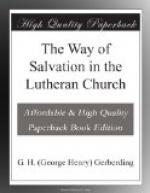In the first place, let there be a revival in each individual heart. Let there be an earnest and prayerful return to the neglected Word. Let there be a devout reading and meditation of the Law of God, an earnest, persevering searching of the heart and life in the light of that law, until there is a feeling of guilt and shame. Then let there be a prayerful reading and re-reading of the Penitential Psalms, the seventh chapter of Romans, the fifty-third of Isaiah, the fifteenth of Luke, the fifth and eighth of Romans, and the epistles of John. Along with this private use of the Divine Word, let there be a like prayerful public use. In case of perplexity and doubt, let there be an unburdening before the pastor, with a request for instruction and prayer. This process will bring about penitence for sin and faith in Christ. Let it continue to be a daily dying unto sin, a daily living unto righteousness, a daily putting off the old man, a daily putting on the new man—a daily repentance for sin, and a daily turning to and laying hold of Christ. Such a revival is Scriptural and efficacious. It will not only put an end to the languor and deadness of the past, but it will preclude the necessity of future periodic excitements.
Along with this individual reviving, let there be an earnest praying and striving for a reviving of the whole congregation, a life that may abide. Let every service in God’s house be a revival service. Let each worshiper be a mourner over his sins, each pew an anxious seat. To this end let the preaching of the Word be plain and direct. Let it be full of “repentance towards God and faith in our Lord Jesus Christ.” Where hearts are not wilfully closed against such preaching of “the truth as it is in Jesus,” they will, through its power, become “broken and contrite hearts,” from which will arise earnest pleadings for forgiveness and acceptance. Faith will come and grow by hearing, and hearing by the Word of God. Where the Word is truly preached and rightly heard, there will be a constant and scriptural revival. Each service will be “a time of refreshing from the presence of the Lord.”
In addition to the regular weekly service, the Church also has her stated communion seasons. These, if rightly improved by pastor and people, can be made still richer seasons of Grace.
In our Lutheran Church, with her deep, significant and inspiring doctrine of this holy Sacrament, with her solemn and searching preparatory service, every such season ought to be a time of refreshing. What an auspicious opportunity is here offered for special sermons to precede the Holy Communion, for recalling the wanderer, awaking the drowsy, stirring up the languid, instructing the inquiring, and establishing the doubting! What pastor, who has a Christ-like interest in the spiritual welfare of his people, and who has used his communion seasons to this end, has not often realized that they are indeed times of refreshing from the Lord?




